Milieudefensie (Friends of the Earth Netherlands) was founded in 1971, when there were very few environmental laws on the books. It was not even an available course of study at universities. There was not much of anything going on in the area of the environment.
Cover foto (top): Volunteers of Milieudefensie counting organic products in a supermarket (2003). We did this from 1998 until 2013 to boost the amount of organic products sold in supermarkets.
The country was still busy rebuilding after World War II. The Netherlands was becoming increasingly prosperous. But that prosperity also created problems: congested cities full of cars, polluted rivers with dying fish, air pollution and toxic waste.
The environmental movement that arose during this period put environmental issues on the map. Problems were suddenly being addressed and investigated. And the environment became a household word – as if it had always been that way.
The environmental movement is a successful movement that has achieved a great deal. And, as one of the Netherlands’ largest environmental organizations, Milieudefensie has contributed significantly to the movement’s success. This short history traces a few of the highlights.
See also:Our impact
See also: About Milieudefensie
The environmental movement in the Netherlands was born at nearly the same time as the publication of The Limits to Growth, commissioned by the Club of Rome in 1972. One of the club’s Dutch members, Wouter van Dieren, became the co-founder of Milieudefensie.
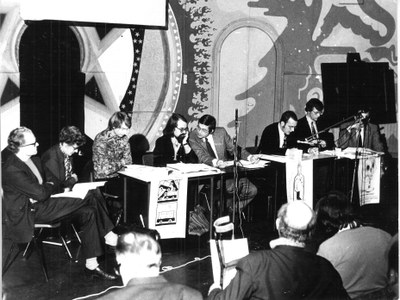 Founded in 1971
Founded in 1971Milieudefensie was founded on 6 January 1971 as the Raad voor Milieudefensie (The Council for Environmental Defence). It was not an organization of activists, but of researchers, including 12 university professors who served on its advisory board. Its start-up capital of 5,000 Dutch guilders (the equivalent of nearly 10,000 euro today) was provided by the Netherlands’ Prince Bernhard.
Milieudefensie began as an organization of researchers, but by the end of 1972 that had changed. Milieudefensie’s membership had grown to 8,000 and it officially became an association. In that same year, Milieudefensie also joined the global environmental network, Friends of the Earth International.
In its early years, Milieudefensie managed to successfully protest the polluting of the Rhine River. We prevented the damming off of the Oosterschelde (Eastern Scheldt) estuary from the North Sea. We also planted trees to protest construction of a new runway at Schiphol Airport.
In 1973, the international oil crisis hit the Netherlands. Oil had to be rationed because not a single Arab country was willing to supply oil to the Netherlands as a result of the Netherlands backing of Israel during the Yom Kippur War. To save energy, the Dutch government started promoting car-free Sundays.
Surprisingly, these car-free Sundays became popular with many among the Dutch general public. When the crisis finally ended, Milieudefensie campaigned for a monthly car-free Sunday in which an estimated 160,000 people participated. The struggle against disposable packaging was another significant issue at that time. Milieudefensie also endorsed the glass milk bottle over the throwaway milk carton.
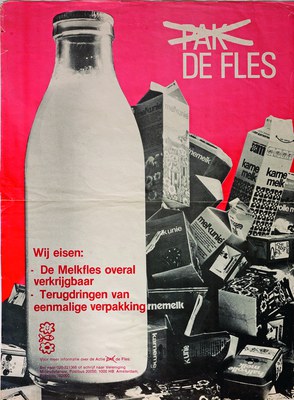 Many years later, Milieudefensie reintroduced car-free Sundays, the glass milk bottle campaign and the tree-planting efforts at Schiphol. It’s pretty handy to know your history!
Many years later, Milieudefensie reintroduced car-free Sundays, the glass milk bottle campaign and the tree-planting efforts at Schiphol. It’s pretty handy to know your history!
In the late 1970s and early 1980s, the Dutch environmental moveFrom a mere player to climate leaderment mounted fierce opposition to nuclear energy. Milieudefensie was especially good at organizing large demonstrations.
Thanks to a broad resistance movement, almost everyone in the Netherlands was against nuclear energy. There is today only one nuclear power plant left in operation.
Until the mid-1980s, Milieudefensie focused mainly on issues close to home, such as pesticides in public parks, glass recycling bins and bottle deposit schemes. It focused much of its attention on informing the public.
But during this period, interest in the environment declined. The public’s attention seemed to be more focused on issues like war and peace (cruise missiles), austerity measures and unemployment. It was the first time in its history that membership actually declined.
However, this quickly changed in 1986 with the nuclear disaster at the Chernobyl Nuclear Power Plant. The world was suddenly forced to face the facts: nuclear energy was unsafe.
Although the disaster happened far from home, the consequences were felt worldwide, including in the Netherlands where, for example, cows were suddenly prohibited from grazing in pastures and the spinach crop had to be destroyed. TV images of the disaster also had a significant impact. The environment and the environmental movement were back in the public eye. As a consequence, Milieudefensie’s membership doubled in a very short period of time.
Milieudefensie also began targeting CFCs in aerosol sprays (the ozone layer), PVC toxins in packaging and carcinogenic cadmium in Heineken’s yellow beer crates. Cadmium was used to dye the crates yellow. Today, Heineken’s crates are green and no longer a health hazard, thanks to Milieudefensie – although it did take until 2003 for the change to finally take effect!
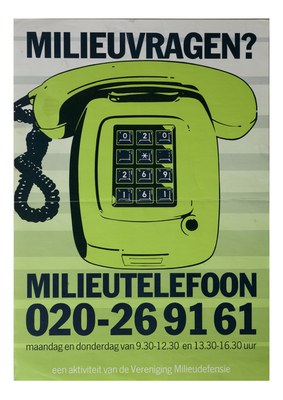 More and more people were looking for information on everything to do with the environment and the Milieutelefoon (our environmental hotline) answered many of their questions.
More and more people were looking for information on everything to do with the environment and the Milieutelefoon (our environmental hotline) answered many of their questions.
The Milieutelefoon was a great success; at its peak, the Milieutelefoon answered thousands of questions about the environment annually, which led other countries to adopt the initiative. In 1998, the Milieutelefoon became independent and, to this day, continues under the name MilieuCentraal.
In 1988, Milieudefensie launched its ‘Heart for the rainforest’ campaign, collecting some 400,000 signatures in support of the preservation of the rainforests. The campaign urged dramatic reductions in the use of tropical hardwoods.
The result of the campaign was the introduction of the FSC trademark, which is still in use today. Its first director in the Netherlands was a former Milieudefensie staff member.
Milieudefensie also focused on sustainable agriculture (for example, against excessive pesticide use in potato farming), green energy and recycling. To put an end to acid rain, campaigns were launched demanding cleaner cars and reduced traffic. Milieudefensie also addressed the issue of disposable packaging – volunteers went to supermarkets and retail shops to put stickers on packaging that was harmful to the environment.
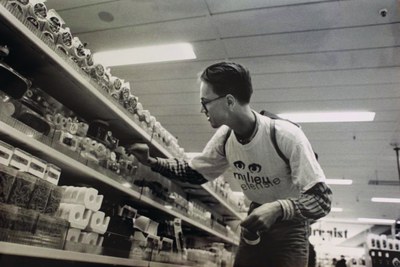 The international environmental movement took notice of Milieudefensie’s 1992 Action Plan for a Sustainable Netherlands. The plan pointed out that everyone in the world could be leading better lives without seriously depleting all of our natural resources and further polluting the earth. Milieudefensie’s staff developed this unique Action Plan themselves, and it was adopted worldwide.
The international environmental movement took notice of Milieudefensie’s 1992 Action Plan for a Sustainable Netherlands. The plan pointed out that everyone in the world could be leading better lives without seriously depleting all of our natural resources and further polluting the earth. Milieudefensie’s staff developed this unique Action Plan themselves, and it was adopted worldwide.
The Action Plan summary was translated into three languages and was proudly distributed by the Dutch Minister of the Environment and his delegation at an environmental congress in Rio de Janeiro.
In early 1995, 'Towards a Sustainable Europe', the European version of the Action Plan was :, commissioned by Friends of the Earth Europe and Milieudefensie, and drafted by the Wuppertal Institute.
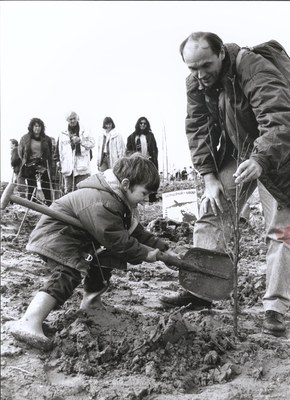 Throughout the 1990s, Dutch politicians wanted to give traffic and transport plenty of room. New harbours and roads were being constructed and Schiphol Airport was also allowed to expand. In response,
Throughout the 1990s, Dutch politicians wanted to give traffic and transport plenty of room. New harbours and roads were being constructed and Schiphol Airport was also allowed to expand. In response,
Milieudefensie in 1993 launched its 'Schiphol is big enough’ campaign – a campaign that lasted some 10 years.
We bought two parcels of land right where Schiphol was planning to build its new runway and sold these to the public in small allotments. Then, on 6 November 1994, we organized a special tree-planting event to create a ‘Roaring Forest’ (Bulderbos). About 8,000 people bought trees and 6,000 participated in planting their own trees in the new forest.
In 1995, Milieudefensie organized one of the Netherlands’ largest environmental demonstrations ever. The demonstration at Schiphol airport attracted 12,000 people. Later in 1995, activists managed to block one of Schiphol’s runways for one hour. In 1998, Milieudefensie activists climbed up on an aeroplane, preventing it from taking off.
These demonstrations and protests prompted the government to organize a meeting between Schiphol and Milieudefensie. Unfortunately, none of the issues were resolved and Milieudefensie was left with no options to block construction of the new runway.
In 2001, the Bulderbos was seized by the government, although a second parcel of land is still owned by Milieudefensie. This second tree plantation, also called Bulderbos, is located right next to the new runway and is still maintained by volunteers to this day.
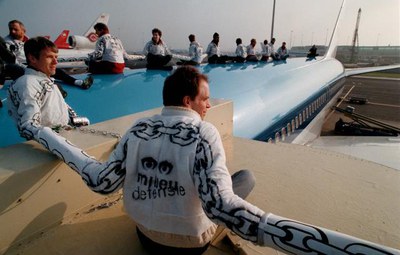 Environmental campaigns in the 1990s often focused on sustainable alternatives. Milieudefensie increasingly began targeting businesses on issues such as organic food, sustainable timber and recycling. In 1997, Milieudefensie and Philips came to an agreement on the recycling of electrical appliances.
Environmental campaigns in the 1990s often focused on sustainable alternatives. Milieudefensie increasingly began targeting businesses on issues such as organic food, sustainable timber and recycling. In 1997, Milieudefensie and Philips came to an agreement on the recycling of electrical appliances.
Furthermore, we began working with DIY home improvement stores to import more sustainable lumber. We worked with advertising circular distributors to address the issue of paper waste.
A mailbox sticker was created for those who didn’t want to receive these advertising circulars in their mailbox. This Ja/Nee (Yes/No) sticker was a big success and is now commonly found throughout the Netherlands.
In 1998, Milieudefensie launched its ‘Eco-counts’ campaign. The idea was simple: each year volunteers would count the number of organic products available in supermarkets throughout the country to encourage supermarkets to start carrying more organic products.
The campaign was effective because no supermarket wanted to lose this counting game. We counted products for 15 years until 2013. The campaign became quite renowned for its effectiveness.
In 2005, we adapted the strategy to garden furniture. The aim was to focus attention to the sourcing of sustainable and non-sustainable timber. This campaign was also a great success – five years after its launch, DIY stores and garden centres were already carrying much less unsustainable timber.
In 1999, Milieudefensie addressed the issue of the disappearing Dutch countryside, which was increasingly being appropriated for development. Business parks were cropping up everywhere.
In response,Milieudefensie took on the motto : ‘Draw a line: protect our green spaces and preserve the peace’. The campaign became an immediate and popular success and resulted in the termination of countless construction plans. The campaign lasted for a total of 10 years.
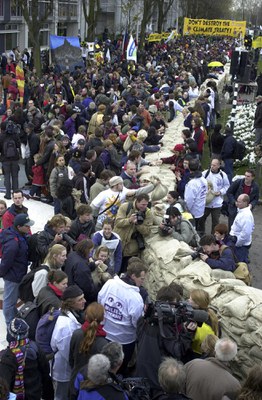 The 21st century began with a spectacular protest that was witnessed worldwide. In 2000, The Hague hosted a major UN international climate conference. Milieudefensie, together with Friends of the Earth International (FoEI), conceived 'the dike against climate change’ campaign.
The 21st century began with a spectacular protest that was witnessed worldwide. In 2000, The Hague hosted a major UN international climate conference. Milieudefensie, together with Friends of the Earth International (FoEI), conceived 'the dike against climate change’ campaign.
Some 6,000 activists from 40 countries built a 400-metre-long dike made of sandbags in the immediate vicinity of the congress centre. The hoped-for climate change accord remained elusive, but Milieudefensie and FoEI had certainly given it their best effort.
Meanwhile, our disputes with Shell seem to never end. Many of these conflicts focus on the massive oil spills in Nigeria. For years, we’ve demanded that Shell and its shareholders address this pollution issue and take care of the victims. This attracted a great deal of media attention, but, meanwhile, the polluting of Nigeria continued.
That’s why Milieudefensie, together with four Nigerian farmers, initiated a lawsuit against Shell in 2008. It was the first time a Dutch company was sued in a Dutch court for the pollution it had caused abroad.
In 2013, the judge ruled that Shell was indeed responsible for polluting at least one of the three villages. Both Milieudefensie and Shell have since appealed the court’s decision on various grounds. In the end it lasted until 2021 before a final verdict was reached. But that verdict was worth the wait: Shell was convicted.
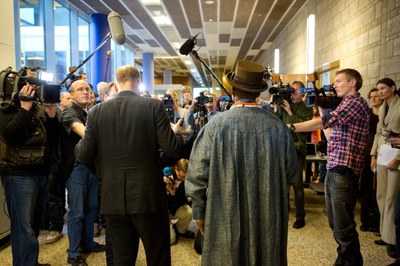
>Read the whole story on the lawsuit against Shell
In other issues, in 2004, the air in the Netherlands was judged to be among the most polluted in Europe. In response, Milieudefensie launched its campaign ‘The Netherlands can’t breathe’. Milieudefensie attracted attention with its banners on busy motorways, its volunteers who cleaned the soot from dirty windows plus we came up with a list of the dirtiest streets in the Netherlands.
In 2012, the ongoing campaign was renamed ‘United for healthy air’. Milieudefensie lent its support to local groups throughout the country who took action by testing the air in their own streets to find out how polluted they were.
Local residents tested the air in 100 locations.They brought the findings to their local municipalities and demanded action. Thanks to this campaign, air pollution became a hot topic in town councils and even in the Dutch Parliament.
But actually cleaning the air has proven to be a slow process – too slow. So, in 2017, Milieudefensie filed a lawsuit in court – and won! The government was ordered to act with all due haste to reduce air pollution. Funding for the lawsuit was raised through various crowd-funding-like public initiatives .
>Read all about this particular anti-pollution case here
In 2006, Milieudefensie launched a citizens’ initiative to put an end to factory farming. A citizens’ initiative, in short, is a proposal that a group of citizens can present to Parliament if over 40,000 people sign a petition.
Milieudefensie’s initiative proposed a switch to sustainable farming methods for all cows, pigs and chickens. This is more humane for animals, and does not contribute to environmental pollution. Furthermore, it doesn’t rely on animal feed from South America where rainforests are cut down to make room for these crops.
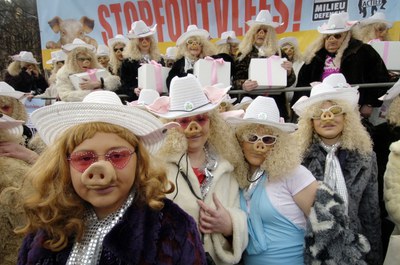 The citizens’ initiative was submitted on 13 February 2007, with 106,975 signatures of support. This was the first time that Parliament ever discussed a citizens’ initiative.
The citizens’ initiative was submitted on 13 February 2007, with 106,975 signatures of support. This was the first time that Parliament ever discussed a citizens’ initiative.
The campaign became famous because of the participation of the ‘Miss Piggies’, volunteers who wore pig masks, sunglasses, wigs and fancy dresses.
Parliament discussed the initiative on 13 December 2007 and Milieudefensie spokesperson, Wouter van Eck, was allowed to address Parliament. Unfortunately, a majority voted against the proposal.
In 2011, Milieudefensie launched their ‘Shale gas-free Netherlands’ campaign, which brought together neighbourhood groups and environmental organizations to oppose fracking for shale gas.
We started a petition and requested that municipalities and the provinces declare themselves shale gas-free. 70,000 people signed the petition, and 223 of a total of 388 Dutch municipalities and 10 of its 12 provinces declared themselves to be shale gas-free.
Milieudefensie brought together the various anti-fracking groups to ensure that the message was heard by Parliament. This was a very successful campaign because on 10 July 2015, the government announced a five-year fracking ban.
In 2014, Milieudefensie officially launched its campaign against the Transatlantic Trade and Investment Partnership (TTIP), a trade agreement between the EU and the US that was then being discussed.
But very few had ever heard of TTIP until Milieudefensie launched its campaign. That quickly changed, because on 10 October 2015, 7,000 people took part in a demonstration organized by Milieudefensie, Greenpeace and the FNV, the Netherlands’ largest trade union.
Resistance to TTIP continues to grow as more and more organizations, farmers, businesses and individuals join the movement. There is, at this point, very little chance it will ever be adopted.
In 2017, Milieudefensie embarked on its campaign for fair milk. Farmers are currently earning too little for the milk they produce, which makes it more difficult for them to produce sustainable milk. Supermarkets can make the difference here by paying farmers a fair price.
Our first success came on 17 November when Jumbo, one of the largest Dutch supermarket chains, agreed to only sell fair milk and dairy products beginning in 2022. And, as an old Dutch proverb points out: if one sheep leaps over the ditch, all the rest will follow.
This seems to be true in the case of supermarkets because, soon afterwards, another supermarket chain joined the campaign, Albert Heijn, the largest supermarket chain in the Netherlands! The rest will no doubt soon follow their lead.
In 2015, the world concluded the Paris Climate Agreement. Overnight, the newspapers began publishing an abundance of stories about global warming. As if a switch has been flicked.
This was indeed the case for Milieudefensie. Climate had been a topic since the 1980, but henceforth climate became our only topic. The issue is so urgent that we couldn’t do otherwise. We’re fully focused on binding as many people to our cause as we can to expand our influence and prevent dangerous climate change.
Milieudefensie’s influence has continued to increase and people are taking notice. In 2020, our director Donald Pols occupied 39th place in a leading newspaper’s top-200 of most influential Dutch people (no new top-200 has been published since).
In 2017, Milieudefensie started drawing attention to climate justice. We published research that caused a stir: It turned out that ordinary people and smaller companies were footing the bill for the greening of the economy, contributing much more than the large companies. Major polluters such as Shell, Tata Steel and energy company RWE were paying pittance, while receiving billions to continue polluting.
In addition, we showed it’s mainly people on higher incomes who benefit from subsidies for sustainable solutions such as solar panels and electric cars. These subsidies are of little use to those on lower incomes, because they only cover a small part of the costs. Milieudefensie’s director Donald Pols issued a warning that climate policy is in danger of becoming a source of conflict, where in fact we need everyone on board to solve the climate crisis.
Climate justice is gaining ground thanks to Milieudefensie. No politician can ignore the issue any longer. It is widely discussed and it is included in almost all party programs.
In 2019, the Netherlands finally gets its Climate Act. At the initiative of Milieudefensie and its youth organisation JMA, the environmental movement had been campaigning for a climate act since 2007. Milieudefensie even wrote a comprehensive legal text that might serve as a template. This text forms the basis for the proposal submitted to Parliament by two parties (PvdA (the Dutch Labour Party and GroenLinks (the Dutch Greens)) in 2016.
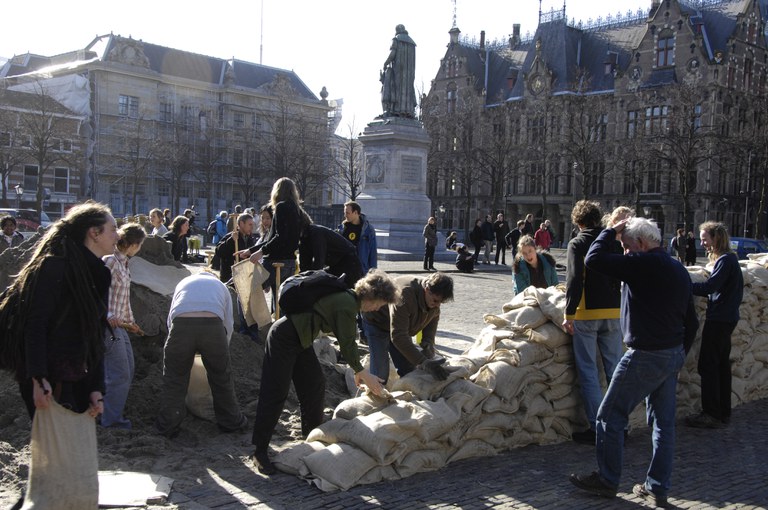
The act as ultimately adopted is a little less specific than our proposal. But it did managed to rally 7 political parties behind it: a comfortable majority. With this Act, the Netherlands commits to reducing CO2-emissions by 95% in 2050 (compared to 1990). The aim for 2030 is less ambitious (49%) and is not an obligation, but an ambition.
How the Climate Act’s objectives will be achieved is not detailed in the Act. This is negotiated between public authorities, consumer organisations, industry, farmers organisations, network operators, trade unions, employers, environmental organisations. Milieudefensie is also at the table. Which is a fortunate thing.
Thanks to Milieudefensie, the Dutch climate agreement turned out a lot more equitable. Households are footing less of the bill for the greening of the large polluters than these large polluters would have liked. Naturally, we are proud of this. But too much is wrong with the agreement to sign it. Important topics have been declared taboo by the authorities: livestock numbers, air traffic, road pricing and a general carbon tax. The Netherlands’ international climate impact is also not taken into account.
In 2019, Milieudefensie launches Operation Climate. Operation Climate gives a voice to people who are otherwise not heard in the climate debate. We went canvassing door-to-door, in community centres, meal clubs and vocational education (MBO) schools. Those who are not in can join the discussion online. Ultimately, 30,000 people in total participated.
The outcome: The Dutch want a fair climate policy in which the polluter pays, everyone contributes according to their financial capacity, and the government invests in sustainable solutions for all. This campaign led to the establishment of over 30 local climate groups that are still active today.
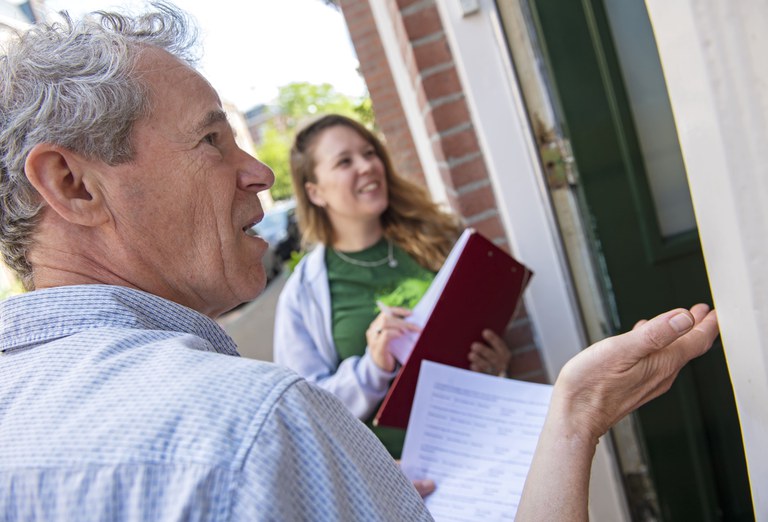
In 2019, Milieudefensie takes the initiative for the biggest climate march our country has ever known to date: the Amsterdam Climate March. Almost all environmental organisations, trade unions and other civil society organisations decide to participate. The aim is to demonstrate to the government that there is ample support for a fair and ambitious climate policy. 10 March is the day, with 40,000 people braving the torrential rain.
The march has immediate effect, because Prime Minister Rutte feels compelled to express his support for a carbon tax for industry. Which was indeed introduced at a later stage.
It took 13 years. Two of the plaintiffs from Nigeria, farmers and fishermen, have by then already passed away. But the ruling of early 2021 is a milestone. For the first time, a multinational company is convicted in its home country. The judge ruled that Shell’s headquarters should have done more to prevent spillage. And Shell Nigeria is ordered to compensate 3 of the 4 plaintiffs for damages suffered. As yet, there has been no ruling in the case of the 4th farmer.
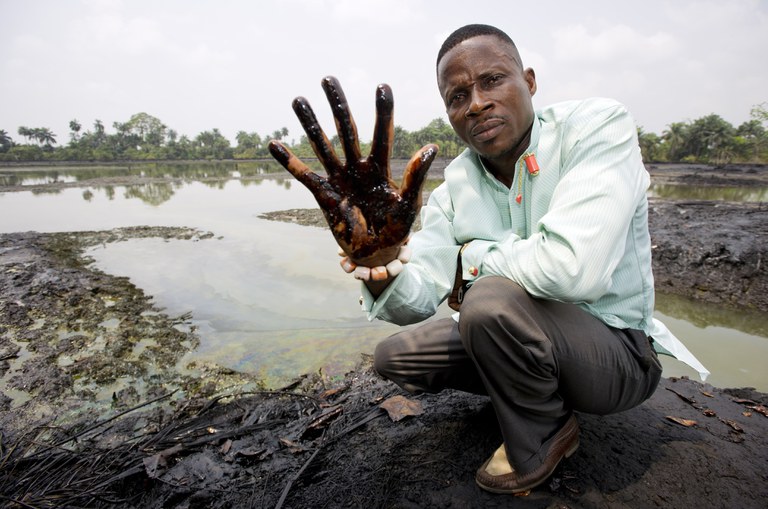
Milieudefensie’s director Donald Pols reflects: "It is a big win that Shell is finally forced to clean up its mess. This is a warning to all Dutch multinationals involved in injustices world-wide. The ruling gives victims of environmental pollution, land-grabbing or exploitation a better change of winning a legal battle.”
>Read more about this landmark ruling here
In the run-up to the 2021 elections, Milieudefensie targets politicians and the electorate. We call on people to vote with ‘our children’ in mind. Because they are the ones who will be paying the price if we fail to prevent dangerous climate change. 65,000 people sign our petition to politicians. Another 60,000 visit our voting guide and 35,000 people participate in the Climate Alarm in 44 cities across the Netherlands.
The campaign is carried on after the elections. We now no longer focus on voters, but on the elected politicians. We ask them: Put the climate first. On 10 June 2021, for example, we did this with full-page advertisements in various newspapers. The money to pay for these is raised by the public themselves.
"We are all desperate for good news about our climate. For a breakthrough. So that we know that our children will have a viable future. And today that breakthrough is here. Today we are making history." This is what we wrote on our website on May 26, 2021 when the judge ruled that Shell must go green. The biggest polluter in the Netherlands and one of the biggest polluters in the world must do much more to prevent dangerous climate change.
It is a ruling that is unprecedented and which dominates the news world-wide for days. It makes all the front pages in the Netherlands and far beyond. Its impact is comparable to that of the Paris Agreement itself. Milieudefensie and 17,000 co-claimants have done the impossible in bringing 1 of the largest and most powerful companies in the world to its knees.
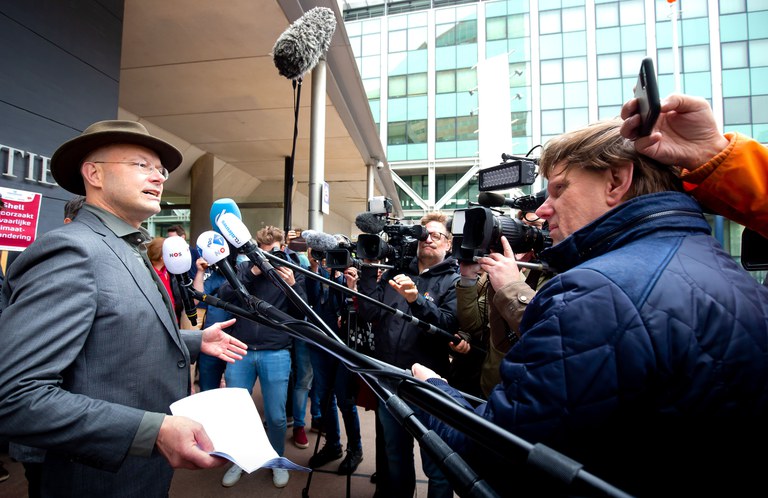
It is the greatest success in Milieudefensie's history. This ruling changes everything. We now have it in black and white: the biggest polluters are personally responsible for preventing dangerous climate change. Immediately after the verdict, similar cases against multinationals were launched all over the world. For the first time, there is a serious prospect of a breakthrough.
>Read more on the Shell climate case
Following its victory in its climate case against Shell, Milieudefensie does not lean back: 29 other large multinationals headquartered in the Netherlands are issued with a letter in early 2022. It concerns large polluters in various sectors of the economy.
Our letter asks these companies to send us their climate plans by 15 April at the latest. We want to know what these companies are doing to prevent dangerous climate change. The plans they send will be assessed by the New Climate Institute, a renowned international research agency. Those failing to respond or submitting a substandard plan risk being taken to court.
As Shell’s Board of Directors learned to its cost at 25 April 2022, they also run a personal risk if they default.
For a long time, Milieudefensie was just one of the players in the debate, first about our environment and later about our climate. Sometimes a noticeable player with actions that stood out. Since 2015, Milieudefensie has become a highly influential player; the most influential climate organisation in the Netherlands.
We believe in the power of people. When people get organised and join forces to fight injustice and demand change, they can change the world. This is why, above all else, we invest in people. Our power for change is growing and making us stronger every day. Together, we can force hesitant politicians and corporations unwilling to change to act. To ensure that our children and all children across the world will also still have a wonderful future ahead.
This brief overview ends here. But Milieudefensie’s story is only just beginning. Milieudefensie will continue to make history as it goes on defending the environment and all of us who are affected by pollution and climate change. A sustainable and fair world? Together, we make it happen!
Our website uses cookies to ensure the use and functionality of this website. Read more about our cookie policy